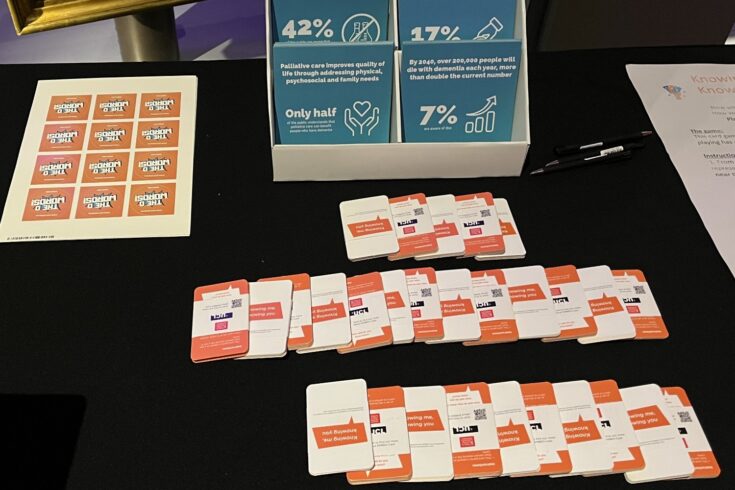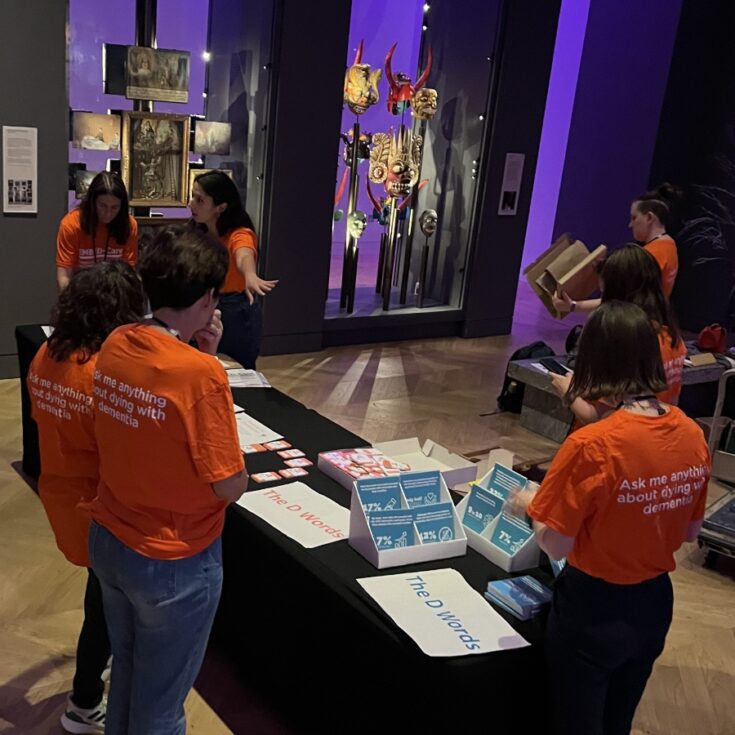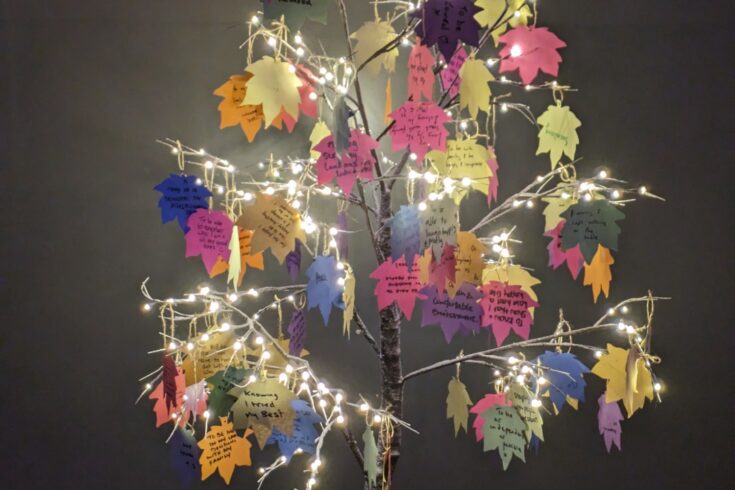By 2025, it’s estimated that over one million people in the UK will have a diagnosis of dementia. Almost all of us will know someone living with the condition.
A team of researchers increased younger adults’ knowledge of dementia and awareness of the importance of sharing end-of-life wishes with family and friends as part of a Science Museum Lates evening of activities. The researchers from University College London (UCL) and King’s College London (KCL) led ‘The D Words’ event on choices around dementia and dying.
The team are now using learnings from this event to inform their next public engagement event at Science Gallery London, which will include content on how to start conversations on these topics.
The D Words at Science Museum Lates
Science Museum Lates is a regular public engagement event held at the Science Museum, London. It runs between 6:30pm and 10:00pm on selected evenings throughout the year and is open to over-18s, with most attendees aged between 18 and 35 years old.
Each Lates event features a range of activities led by different scientists for attendees to take part in. At a Lates event in July 2023 this included researchers from the Empowering Better End of Life Dementia Care (EMBED-Care) research programme, based at UCL and KCL.
‘The D Words’ comprised three activities:
- Knowing me, Knowing You: a card game informed by findings from EMBED-Care data collection. In pairs, participants picked three cards out of 13, each with suggested preferences around end-of-life care (and the option of two blank cards to write their own). Each pair then tried to guess what each other had chosen to see how well they knew each other.
- Wishing Tree: visitors were invited to write what would be important to them towards the end of life on a leaf and to hang this on the tree.
- Quiz: this tested visitors against EMBED-Care’s YouGov survey about dementia and palliative care and how much they knew about these subject areas.
Fifteen of the EMBED-Care team attended to chat about the research and respond to wider questions on dementia and dying. This included two members of EMBED-Care’s Patient and Public Involvement group, both of whom have lived experience of caring for a relative with dementia.
Why engage with young people about dementia?
Dr Charlotte Kenten, Senior Research Fellow and Programme Manager at EMBED-Care, says:
The Science Museum Lates target audience of 18-35 year olds are looking for an alternative night out with friends and have a broad interest in science. They are keen to be exposed to ideas and information and to come away from the evening knowing something new.
This was the ideal audience for EMBED-Care as the primary audience for our own public engagement work are 18-25 year olds. The reasoning behind this is that as a group they will be increasingly affected as the prevalence of dementia is predicted to significantly increase and it is likely they will know people with dementia or go on to eventually be diagnosed with this themselves.
The event offered an opportunity to talk about end-of-life care, which tends not to be part of everyday conversations, and to ask questions to clinicians and researchers working in this field.
Both ‘Knowing me, Knowing you’ and the Wishing Tree emphasised the importance of thinking about and sharing end of life wishes with family and friends. This is particularly important in the context of dementia where people may lose their capacity to express these wishes as the disease worsens. This means that wishes need to be shared early so family or friends can be sure care reflects the preferences of the individual.
Developing an audience-appropriate event
Having been offered the opportunity to run an event at Science Museum Lates, several of the EMBED-Care team attended a Lates event to see and experience this for themselves. This provided background information on the types of activities that were offered and what appeared to work well for the visitors. The visit informed the development of ‘The D Words’.

Table at the event with cards, postcards and stickers. Credit: EMBED-Care team
The core content drew on data generated through EMBED-Care such as its national YouGov survey, which examined public knowledge of these issues, and data generated from several EMBED-Care systematic literature reviews. The decision to incorporate a game element as well as imparting factual information was based on seeing what Lates visitors enjoyed taking part in.
The team drafted activities that would be engaging and encourage people to reflect and think on the issues raised rather than the team simply disseminating facts and figures about dementia. The activities were tried with colleagues who reflected the target audience. The EMBED-Care Patient and Public Involvement group, all of whom all former carers for a relative with dementia, reviewed the content of the activities and felt the modes of delivery were appropriate to inform a young audience about aspects of dementia and thinking more broadly about the end of life.
The recce also influenced the team ‘uniform’ of orange t-shirts to be cohesive and identifiable with ‘EMBED-Care’ emblazoned on the front and an invitation to ‘Ask me anything about dying with dementia’ on the back. The team planned for the event space to be visually appealing, with the wishing tree attractively shining to catch the attention of visitors and the space set up to encourage interaction and mingling with the research team rather than standing behind tables.
On the evening itself members of the team took turns to wander around the museum chatting to visitors and using printed cards with the YouGov survey results to start to engage people with the topic and direct them towards a sea of orange!
Being part Science Museum Lates, as an established public engagement event, meant that some key considerations, for example, location, venue accessibility, publicity and the timing and duration of the event were arranged by the Science Museum and known in advance.

The EMBED-Care team setting up for the event. Credit: EMBED-Care team
Engagement successes
Dr Kenten says:
We widened the reach of EMBED-Care to the Lates audience and raised awareness of dementia and the need to think in advance about end-of-life care with a group primarily aged between 18-35 years old. We estimate across the course of the evening fifty people completed the quiz, the card game reached about 150 people and over seventy leaves were added to the wishing tree. In the region of 200-250 people visited our event across the course of the evening.
We commissioned an expert to undertake an evaluation to understand the target audience’s understanding and interest in dementia and end of life care. All those asked for their views were aged 18-30 years old. This focused on whether visitors had picked up new knowledge, their emotional response to the evening and whether they would be interested in an exhibition about dementia and end of life care.
The evaluation drew on observational data and vox pop style interviews with those who had taken part in at least one of the EMBED-Care activities. Whilst a small number of visitors had some prior knowledge of dementia, others realised that they did not know as much as they thought they did about dementia via family experience or the media.
There was a split amongst young people for whom talking about the end of life was ‘too scary’, or it was too far on the horizon, and those who were receptive to having these conversations and felt it was important. Some felt that they may need some guidance as to how to raise the topic with family and friends.
When it came to the activities, playing the card game ‘Knowing me, Knowing you’ with a friend or partner they often learnt something about the person they were playing the game with. The quiz answers surprised many, particularly that cancer and heart disease receive more research funding despite the dying with dementia statistics.
De-brief sessions with our own team and the two EMBED-Care PPI members who attended the event found that the evening was an overwhelmingly positive experience, for many it was a new experience and one that they would be keen to be part of again in the future.
From the evaluation we have established that there is interest in an exhibition about dementia and end of life care. We will draw on the evaluation to inform the development of our future public engagement event at Science Gallery London. We will provide more information about the progression of dementia; guidance on how to start conversations with relatives about the end of life and ensure that those with knowledge about dementia are available to talk with visitors and answer questions.
Visitors were keen on novel, hands-on experiences, which we will build into our future work and may involve craft activities or other games to encourage our target audience to visit our exhibition and engage with issues that may otherwise be avoided. There was also a generational interest in activism and using events as catalysts to raise further awareness and to influence campaigns, for example, many visitors felt an injustice that dementia receives significantly less funding compared to cancer or heart disease.
Support from ESRC
EMBED-Care is grant funded by the Economic and Social Research Council (ESRC) and the National Institute for Health and Care Research.
Additional seedcorn funding was provided by KCL’s Faculty of Nursing, Midwifery and Palliative Care. The funding from KCL paid for the items that were used for the evening, including the design and printing of the card game and the purchase of the tree.
What next?
Dr Kenten says:
Looking ahead to EMBED-Care’s own exhibition at Science Gallery London in April and May 2024, we will apply our learning from the Lates visitors who expressed an interest around an event focused on the lived experience of dementia with a tone of hope and not ‘doom and gloom’.
We will plan to incorporate interactive aspects with information imparted in an accessible manner alongside the presence of experts to chat with and for the exhibition to provide some overall guidance about having conversations about the end of life and death.
What attendees said
I’ve tried [to talk about it], but my mum calls it tempting fate, so she won’t talk about it.
I never really think about, like, if I would need care at the end of my life because I’m not there at that moment of time you know what I’m saying?
I think it’s good to address it [dying], because it’s better to know than, when you deal with it, to be frantic and make the wrong choice.
I don’t think I’d realised how, like, important I think it would be for me to have like proper care and not just people I love surrounding me.
It was a game [Knowing You, Knowing Me] that I would want to play with my family in the future, just so that like I definitely would want to know [their wishes].
But I do think, you know, this sounds really bad, I think [dementia] needs to be more famous, as a disease, like cancer is really famous, heart disease is really famous, and having exhibitions will make it more famous.
Top image: The wishing tree at the end of the evening with attendees’ wishes hung on it. Credit: EMBED-Care team

